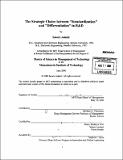The strategic choice between "standardization" and "differentiation" in R&D
Author(s)
Adachi, Satoru
DownloadFull printable version (3.189Mb)
Other Contributors
Management of Technology Program.
Advisor
Michael A. Cusumano.
Terms of use
Metadata
Show full item recordAbstract
In today's world of advanced technology and global reach, one company cannot necessarily make a significant technological innovation. A company that pursues a technological advantage needs to manage global collaboration or competition appropriately. Over the years, the "standardization" of technology has been one of the major strategies with which to encourage technological innovation and acquire a competitive advantage. However, a standardized technology does not necessarily contribute to creating a competitive advantage, and the "differentiation" of technology sometimes provides a better competitive advantage than standardization can. This thesis focuses on the strategic differences between the "standardization" and "differentiation" of a technology. The purpose is to gain insight into standardization and differentiation, looking them as drivers of R&D activities in a company pursuing technical competence. The thesis suggests advantages and disadvantages of each strategy and analyzes circumstances that affect strategic differences. The first part of the thesis establishes the fact that the strategic difference has a less impact on business activities and commercial success than on R&D. (cont.) The second part clarifies the impact of the difference on R&D activities, and it consists of three case studies from the technological areas in which the author has experience. The observations from the case studies lead to a decision matrix for the strategic choice between standardization and differentiation. If a market requirement is uncertain, the differentiation better facilitates effective R&D by means of its flexibility; the technology consolidation linked to standardization would not work well in this situation. Also, if technology elements which satisfy market requirements or target performance are immature, differentiation makes R&D more effective because of its relative lack of restrictions; inherent competition and selection to avoid redundant work linked to standardization would not work well in this situation.
Description
Thesis (S.M.M.O.T.)--Massachusetts Institute of Technology, Sloan School of Management, Management of Technology Program, 2006. Includes bibliographical references (leaves 58-59).
Date issued
2006Department
Management of Technology Program.; Sloan School of ManagementPublisher
Massachusetts Institute of Technology
Keywords
Management of Technology Program.